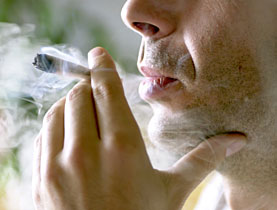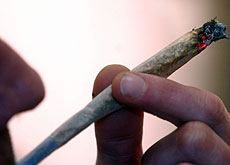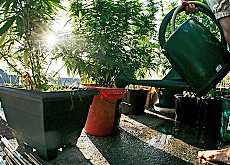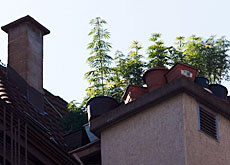Pot smokers hope for support in parliament

Cannabis is set to make news headlines again this week when parliament meets to discuss a plan to decriminalise the psychoactive drug.
Switzerland became notorious for its liberal drugs policy in the late 1980s but public opinion has changed in the meantime. Recent studies on the negative impact of cannabis appear to back opponents of moves towards decriminalisation.
Geri Müller, a Green Party parliamentarian and senior member of the committee behind the people’s initiative, is convinced that the fight for the hallucinogenic drug is not lost.
“I think there is widespread agreement that the current situation is untenable. And the vote in the House of Representatives could be close,” he said.
Müller says many of the newly elected parliamentarians, even of conservative and rightwing parties, have campaigned on a liberal drugs policy.
However, three of the four main parties in the House have come out against the proposal. Only the centre-left Social Democrats are officially in favour.
The proposal aims at decriminalising cannabis consumption under strict rules.
The trade in hallucinogenic hemp would not be permitted outright, but controlled by the authorities in a bid to crack down on illegal dealers, according to the people’s initiative handed in with more than 106,000 signatures in January 2006.
Supporters of a liberal cannabis drugs say it makes no sense to treat the estimated 500,000 regular or occasional pot smokers in Switzerland like criminals.
Public opinion
Müller is not discouraged by a number of scientific studies that have highlighted the damaging effects of cannabis consumption, and an apparent shift in public opinion among the young generation.
“The young generation is more concerned about the problems of binge drinking and violence. The cannabis issue seems to have lost in importance, particularly in schools,” he said.
Ten days ago an official assembly of young people clearly rejected the new initiative, saying it sent the wrong signal to teenagers who might smoke cannabis and later become addicted to hard drugs.
Müller dismisses many of the studies as “irrelevant”, saying the scientific community is far from unanimous in its assessment of cannabis.
A study by Zurich University claimed cannabis smokers were more likely to develop schizophrenia. Other researchers said the regular use of the hallucinogenic drug could damage a smoker’s lungs.

More
People’s initiative
Expert views
Drug experts have repeatedly called for a more pragmatic approach to cannabis and for a compromise between individual responsibility and the needs of society for law and order.
The Lausanne-based Swiss Institute for the Prevention of Alcohol and Drug Abuse is in favour of decriminalising cannabis, but argues the initiative is not the right way to go about it.
“Too many questions remain open, notably about growing cannabis for self-consumption,” said spokeswoman Monique Helfer.
She says it’s not the task of the institute to encourage young people to smoke pot. Prevention is a key element of the drugs policy, she adds.
Regardless of the outcome of the debate in the House of Representatives on Wednesday, the Senate still has to discuss the proposal before it will go to a nationwide vote. No date has been set for the ballot.
During the three-week winter session, parliament is also due to continue a revision of the law on narcotics. The main aim is to enshrine the government’s four-pillar strategy of repression, prevention, therapy and harm reduction into law.
Switzerland received widespread attention for its public drug scenes in the country’s major cities in the late 1980s and 1990s.
Voters subsequently rejected opposite initiatives seeking to tighten or ease the official drugs policy. A government proposal to decriminalise cannabis was thrown out by parliament in 2004.
swissinfo, Urs Geiser
A committee handed in nearly 106,000 signatures in January 2006 to force a nationwide vote on a proposal to decriminalise cannabis.
Parliament will begin discussions on the plan in the winter session, which began on Monday. The government has come out against the initiative.
Swiss voters will have the final word on the plan, but no date has been set for the vote.
In 2004 parliament threw out a similar proposal, put forward by the government, to decriminalise cannabis.

In compliance with the JTI standards
More: SWI swissinfo.ch certified by the Journalism Trust Initiative




You can find an overview of ongoing debates with our journalists here. Please join us!
If you want to start a conversation about a topic raised in this article or want to report factual errors, email us at english@swissinfo.ch.